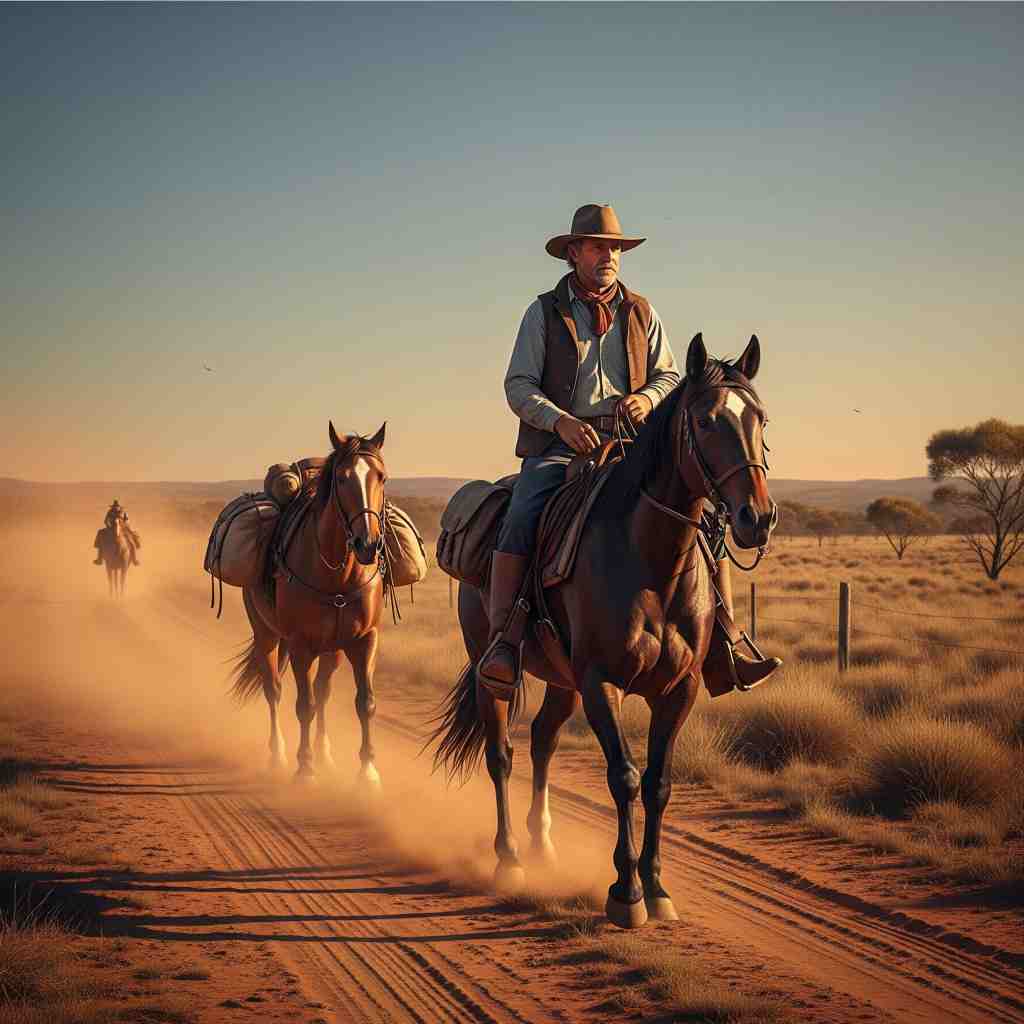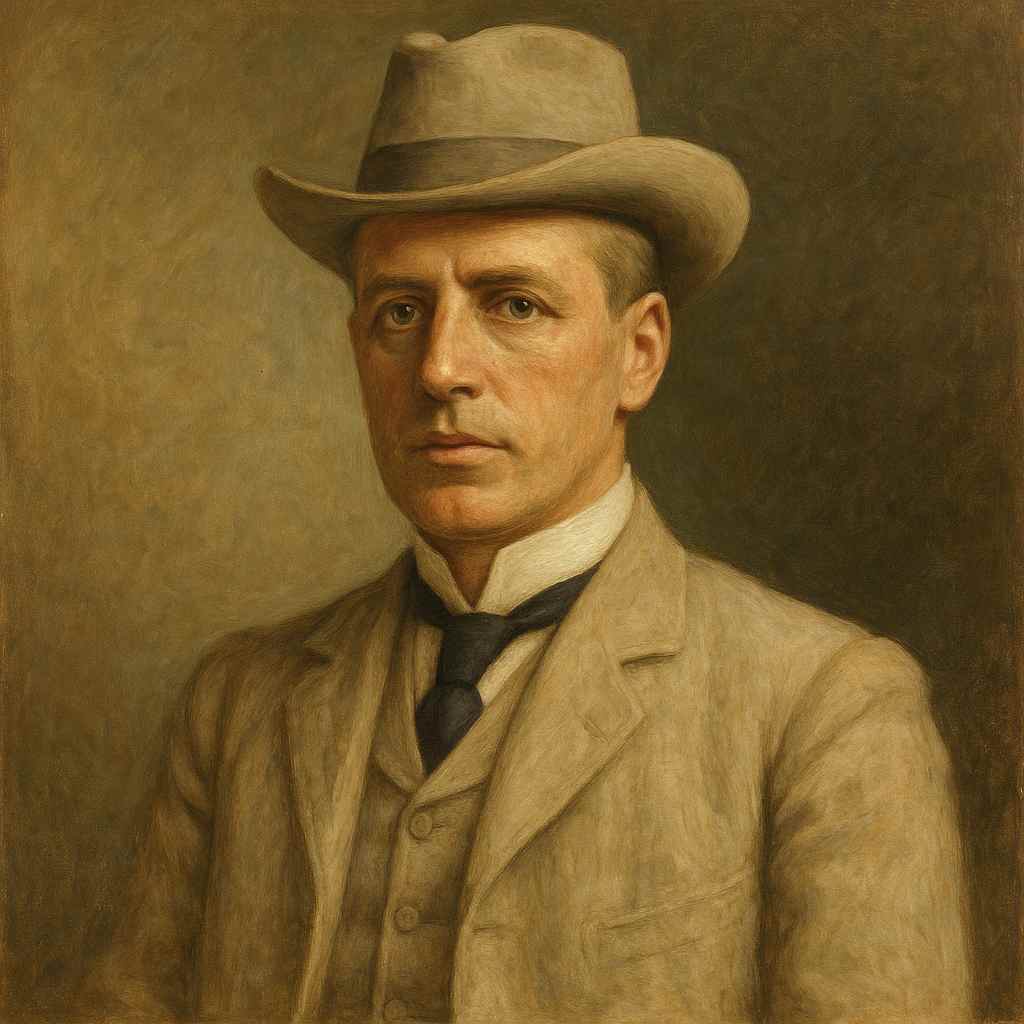A Bushman's Song
Banjo Paterson
1864 to 1941

I'm travellin' down the Castlereagh, and I'm a station hand,
I'm handy with the ropin' pole, I'm handy with the brand,
And I can ride a rowdy colt, or swing the axe all day,
But there's no demand for a station hand along the Castlereagh.
So it's shift, boys, shift, for there isn't the slightest doubt
That we've got to make a shift to the stations further out
With the packhorse runnin' after, for he follows like a dog,
We must strike across the country at the old jig-jog.
This old black horse I'm riding — if you'll notice what's his brand,
He wears the crooked R, you see — none better in the land.
He takes a lot of beatin', and the other day we tried,
For a bit of a joke, with a racing bloke, for twenty pounds aside.
It was shift, boys, shift, for there wasn't the slightest doubt,
That I had to make him shift, for the money was nearly out;
But he cantered home a winner, with the other one at the flog —
He's a red-hot sort of pick up with his old jig-jog.
I asked a cove for shearin' once along the Marthaguy:
'We shear non-union, here,' says he. 'I call it scab,' says I.
I looked along the shearin' floor before I turned to go —
There were eight or ten dashed Chinamen a-shearin' in a row.
It was shift, boys, shift, for there wasn't the slightest doubt
It was time to make a shift with the leprosy about.
So I saddled up my horses, and I whistled to my dog,
And I left his scabby station at the old jig-jog.
I went to Illawarra where my brother's got a farm,
He has to ask his landlord's leave before he lifts his arm;
The landlord owns the countryside — man, woman, dog, and cat,
They haven't the cheek to dare to speak without they touch their hat.
It was shift, boys, shift, for there wasn't the slightest doubt
Their little landlord god and I would soon have fallen out;
Was I to touch my hat to him? — was I his bloomin' dog?
So I makes for up the country at the old jig-jog.
But it's time that I was movin', I've a mighty way to go
Till I drink artesian water from a thousand feet below;
Till I meet the overlanders with the cattle comin' down,
And I'll work a while till I make a pile, then have a spree in town.
So, it's shift, boys, shift, for there isn't the slightest doubt
We've got to make a shift to the stations further out;
The packhorse runs behind us, for he follows like a dog,
And we cross a lot of country at the old jig-jog.
Banjo Paterson's A Bushman's Song
Banjo Paterson’s A Bushman’s Song is a vivid narrative of displacement, resilience, and the unyielding spirit of the Australian bushman. Written in the late 19th century, the poem captures the economic hardships, racial tensions, and class struggles that defined rural Australia during a period of rapid social and industrial change. Through the lens of a wandering station hand, Paterson explores themes of labor exploitation, cultural identity, and the romanticized yet harsh reality of outback life.
This essay will examine the poem’s historical and cultural context, its use of literary devices, and its emotional resonance. Additionally, it will consider Paterson’s own background as a chronicler of bush life, comparing his perspective to that of his contemporary, Henry Lawson, whose works often presented a bleaker vision of the outback. Finally, the analysis will address the philosophical undercurrents of the poem—particularly its meditation on freedom and constraint in a rapidly modernizing world.
Historical and Cultural Context: The Australian Bush in the Late 19th Century
To fully appreciate A Bushman’s Song, one must situate it within the socio-economic landscape of late 19th-century Australia. The poem was written during a period marked by the expansion of pastoralism, the rise of unionized labor, and increasing racial tensions, particularly concerning Chinese immigrants. The 1890s, in particular, saw economic depression, labor strikes, and the consolidation of large landholdings that displaced smaller farmers and itinerant workers.
The speaker in the poem is a station hand—a skilled laborer who must continually move "further out" due to diminishing opportunities. This reflects the reality of many bush workers who, faced with mechanization and the monopolization of land by wealthy squatters, were forced into a nomadic existence. The reference to "non-union shearing" and "Chinamen a-shearin’ in a row" alludes to the fierce labor disputes of the era, where white workers viewed Chinese laborers as undercutting wages, often invoking racist and xenophobic rhetoric.
Paterson’s depiction of the landlord in Illawarra—who demands subservience to the point where even a hat-touch is expected—further underscores the class tensions of the time. The poem thus becomes not just a personal lament but a broader critique of economic and social hierarchies.
Literary Devices and Narrative Technique
Paterson employs a conversational, almost ballad-like style, using the first-person perspective to create intimacy and immediacy. The refrain "shift, boys, shift" functions as both a literal call to move on and a metaphorical acknowledgment of the bushman’s perpetual instability. The repetition reinforces the cyclical nature of his existence—always searching, never settling.
The poem’s imagery is richly evocative of the Australian landscape. Phrases like "artesian water from a thousand feet below" and "the overlanders with the cattle comin’ down" paint a picture of vast, untamed terrain. The "old jig-jog" of the packhorse suggests a rhythmic, almost weary movement, mirroring the speaker’s resigned yet determined attitude.
Paterson also uses humor and irony to temper the poem’s underlying bitterness. The anecdote about the racing horse—a "red-hot sort of pick up"—introduces a moment of triumph amid hardship. Yet even this victory is fleeting, as the speaker must soon move on. The contrast between the horse’s vitality and the man’s transience underscores the transient nature of bush life.
Themes: Mobility, Resistance, and the Search for Autonomy
1. The Necessity of Movement
The central theme of A Bushman’s Song is the inevitability of displacement. The speaker is perpetually on the move, not out of wanderlust but out of necessity. Each stanza presents a different reason for his departure: lack of work, racial tensions, oppressive landlords. The refrain "shift, boys, shift" becomes a mantra of survival, reflecting the broader experience of itinerant workers in an economy that offers little security.
2. Resistance to Exploitation
The poem is deeply anti-authoritarian. The speaker’s refusal to work as a "scab" (a strikebreaker) aligns him with the unionist ethos of the time, yet his disdain for the landlord’s feudal-like control reveals a broader contempt for systemic oppression. His declaration—"Was I to touch my hat to him?—was I his bloomin’ dog?"—is a defiant assertion of dignity.
3. Racial and Cultural Tensions
The reference to Chinese shearers reflects the racial anxieties of the era. While modern readers may critique the xenophobia in the lines, the poem accurately captures the sentiment of many white laborers who saw Chinese workers as economic threats. This moment complicates the poem’s otherwise sympathetic portrayal of the bushman, reminding us that Paterson’s work is as much a product of its time as it is a critique of it.
4. The Illusion of Freedom
Despite the speaker’s nomadic independence, his freedom is illusory. He is always at the mercy of economic forces—whether it’s the scarcity of work or the power of landlords. The final stanza, where he dreams of making a "pile" and having a "spree in town," suggests that even his aspirations are shaped by the very system that displaces him.
Comparative Analysis: Paterson vs. Lawson
Paterson’s romanticized view of the bushman contrasts sharply with Henry Lawson’s grittier depictions. Where Paterson’s protagonist retains a sense of humor and resilience, Lawson’s characters often face unrelenting despair. In The Drover’s Wife, for instance, hardship is unending, with no promise of redemption.
Yet both writers share a deep empathy for the underdog. While Paterson’s tone is more buoyant, his critique of social inequity is no less incisive. The difference lies in presentation: Paterson offers a folkloric, almost heroic resilience, whereas Lawson presents a stark realism.
Biographical Insights: Paterson as Chronicler of the Bush
Andrew Barton "Banjo" Paterson was a city-born lawyer who mythologized the bush from an outsider’s perspective. Unlike Lawson, who lived the hardships he wrote about, Paterson often idealized bush life. Yet A Bushman’s Song reveals a nuanced understanding of its struggles. His ability to blend humor with social commentary makes his work enduringly compelling.
Philosophical Undercurrents: Existential Nomadism
The bushman’s perpetual movement can be read as an existential condition. Like Camus’ Sisyphus, he is condemned to an endless cycle, yet he finds meaning in the struggle itself. The "old jig-jog" is not just a rhythm of travel but a philosophy—a way of enduring in a world that offers no permanence.
Emotional Impact: Nostalgia and Defiance
The poem’s emotional power lies in its balance of nostalgia and defiance. There is pride in skill ("I’m handy with the ropin’ pole"), camaraderie ("shift, boys, shift"), and a wistful longing for stability. Yet beneath the humor lies a quiet desperation—a recognition that the bushman’s way of life is fading.
Conclusion
A Bushman’s Song is a masterful blend of social critique, lyrical storytelling, and psychological depth. Through its wandering protagonist, Paterson captures the resilience and restlessness of a vanishing Australia. The poem remains relevant today as a meditation on displacement, resistance, and the search for dignity in an unforgiving world.
In the end, the bushman’s journey is not just across land but through the soul of a nation—unyielding, unbroken, and forever moving to the rhythm of the "old jig-jog."
This text was generated by AI and is for reference only. Learn more
Want to join the discussion? Reopen or create a unique username to comment. No personal details required!



Comments
No comments yet. Be the first to comment!